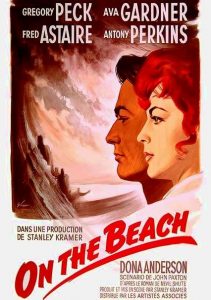On the Beach-1959
Director Stanley Kramer
Starring Gregory Peck, Ava Gardner
Scott’s Review #1,179
Reviewed September 19, 2021
Grade: A-
On the Beach (1959) is a film that showcases a grim subject matter but remains relevant considering the period in which it was made. The Cold War era kept most people on edge with the threat of nuclear war as they rolled into the 1960s.
The lavishness of the 1950s turned into a more distrustful time as countries gained modern technological advances, making nuclear weapons a real possibility.
The film was not met with much praise or popularity at the time.
Indeed, people were content in the cinematic bubbles of nice, comforting films that largely emerged during the 1950s, but On the Beach was a fantastic discovery decades later.
I suppose people expected a sweeping epic romantic adventure, but they received a harsher tale. It’s not nearly as dark as it could have been.
The black and white cinematography is highly effective at relaying a cold and stark world that is left for the film’s characters. Another success is that the film is set in the future, 1964 to be exact, while the film was made in 1959.
The film is hardly a downer. While the subject matter of nuclear disaster and devastation sounds heavy, there is as much romance as social storytelling. The romance between Peck and Gardner is compelling and the best part of the film experience.
As the story begins, we learn that World War III has already occurred, leaving Australia the only remaining safe place for survivors. However, wind currents carrying lingering radiation are headed their way, condemning those on the continent to certain death.
When the survivors receive a strange signal from San Diego, California, Commander Dwight Towers (Peck) must embark on a mission with Lieutenant Peter Holmes (Anthony Perkins) to see if humanity still has hope. They leave behind Moira (Gardner) and Mary (Donna Anderson), the women they love.
Director Stanley Kramer knows his way around a message movie. In 1967, he directed the racially significant Guess Who’s Coming to Dinner, starring Spencer Tracy and Katharine Hepburn.
The romance between Dwight, Moira, Peter, and Mary is my favorite aspect of the film. Dwight has lost his wife and two children, so out of loneliness, he falls for Moira, who has never married and has no one. Their soon-to-be doomed romance is fraught with complications as they tenderly cling to each other, knowing their time is limited.
Peter and Mary, on the other hand, are married with an infant young daughter. A significant conflict the couple deals with is whether to take suicide pills rather than get sick and die a slow and painful death.
There is enough chemistry between Peck and Gardner to keep the viewer engaged, but it’s tough to watch Perkins, a known gay man, play a macho father figure with a newborn. For some reason, it’s also hard not to see Norman Bates from Psycho (1960). I half-expected Peter to attack Mary in the shower with a butcher knife.
Still, the acting is good.
On the Beach states a powerful message in its conclusion. Ultimately, within just a few days of the shifting winds bringing the toxins to Australia, the last pockets of humanity are dead.
Melbourne’s empty, windblown streets are filled with dramatic music over a single powerful image of a previously seen Salvation Army street banner that reads, “There is still time .. Brother”.
Indeed, there is.
This leaves the viewer pondering their fate and the terrible dangers of nuclear war. Decades later, On the Beach (1959) still frightens and teaches about the ravages of world conflict and the plea for a peaceful society.
Oscar Nominations: Best Scoring of a Dramatic or Comedy Picture, Best Film Editing
